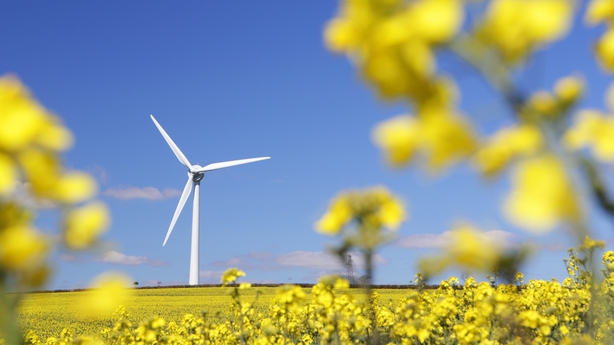Wind energy provided a record 53% of Ireland's electricity last month, an Oireachtas committee has heard.
On the windiest days, the wholesale cost of electricity plunged by three quarters, as compared to the least windy days.
Justin Moran of Wind Energy Ireland said that February saw "the highest ever share of demand ever provided in a single month".
He was addressing the Oireachtas Joint Committee on Environment and Climate Action, which is holding a series of meetings to explore Ireland's renewable energy potential, particularly offshore wind.
On the windiest days, the wholesale price of electricity fell to €130 per megawatt hour, Mr Moran said.
While on the least windy days it rose - by 76% - to €230.
The committee heard that wind energy cut 4.5 million tonnes from Ireland's carbon dioxide emissions in 2020 - more than all other renewables combined.
However, Noel Cunniffe, Wind Energy Ireland's CEO, noted that Ireland charged the highest price for its renewable electricity in a recent international auction.
The amount asked by the Republic was well over double the price set by Spain, and a key cause is the sluggish planning process here, he said.
Mr Cunniffe pointed to "delays right across energy structure", and gave multiple examples of An Bord Pleanála failing to meet its statutory obligation to make a decision on an application "within 18 weeks".
Since 2020, a decision on a windfarm takes an average 51 weeks, he said.
Meanwhile, the investor has to carry the risk that the decision might not go their way, which means higher costs to cover that risk, he said.
Added to this, the lack of investment in electricity grid infrastructure hikes the cost of Irish renewable electricity - again - by more than a quarter (26%), Mr Cunniffe said.

Justin Moran said it took 24 months to get a foreshore licence, which is needed to carry out surveys to see if a windfarm may be viable.
After that, getting planning permission and facing a possible judicial review could take another 24 months, he noted.
Meanwhile, the UK can promise investors that they will have a foreshore licence issued in just 24 weeks, he revealed.
The committee also heard that Scotland is Ireland's key competitor in the realm of green energy.
"People have a right to comment and object", Mr Moran emphasised, and called for "resourcing the [planning] system so it works rapidly and effectively".
Stefan Kaufmann is the German Government's Innovation Commisioner for Green Hydrogen.
Appearing remotely from South Africa, he said that "Ireland has the potential to be a significant player in the world of hydrogen".
After his visit last year, the German-Irish Hydrogen Council was established as a "first initial step" to a deeper partnership between the two countries, he said.
A member of the council, Frank Daly, told the committee that Germany needs to import green hydrogen to decarbonise its economy, and is reaching out to various countries.
He is keen "to lay the groundwork to get business done between Irish and German companies".


